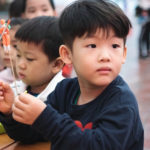Respecting Individual Freedom
Swiss people highly respect personal freedom, allowing children to develop a sense of autonomy and independence from an early stage. As they grow older, children are allowed to participate in and have a say in daily activities, from choosing meals and clothes to picking their favorite movies…
Moreover, parents create opportunities for their children to experience and make decisions in certain situations. Instead of simply telling them how to play a game, parents give them the freedom to choose and explore how to play, allowing children to develop independence and creativity skills.

Teaching Children to Connect with Nature
Swiss parents often encourage their children to engage in exploration and learn about the world around them. This can be done through outdoor activities such as visiting nature reserves, national parks, cycling, hiking, camping, or simply playing in the park.
Swiss children read many books about animals or nature. They are encouraged to ask questions, learn, and share their knowledge. This way, children have the opportunity to explore various types of animals, plants, ecosystems, and diverse nature. As a result, children develop curiosity, research skills, and reasoning abilities.

Avoiding Comparisons with Others
To assess their child’s progress, Swiss parents rely on their own achievements and developments, therefore, they do not impose pressure or compare them with others.
Without relying on others’ standards, Swiss parents focus on developing their child’s talents and strengths. For example, many parents keep a small notebook, recording their child’s progress in learning a new skill, such as playing music, drawing, or writing.
Learning through Real-Life Experiences
Real-life experiences bring many benefits to children’s learning. Swiss parents often involve their children in daily family activities such as cooking, gardening, shopping. As they grow older, they are taught how to manage finances.
Swiss children are also often involved in creating crafts, building models, or carrying out small social projects. Being directly involved in such activities helps them learn and understand different aspects of life.

Valuing Family Relationships
Swiss parents place great importance on building close emotional bonds with their children. They dedicate a lot of time to listen so that children feel safe and loved.
Family meals are also important moments. There, parents show love by cooking their favorite dishes and sharing meals together. Swiss families also often organize gatherings, anniversaries, and festivals to enhance the bond and interaction among members.



































